| | Donald Trump says Israeli hostages in Gaza will be released within days, rare earth stocks surge, an͏ ͏ ͏ ͏ ͏ ͏ |
| |   LJUBLJANA LJUBLJANA |   ASTANA ASTANA |   SHENZHEN SHENZHEN |
 | Flagship |  |
| |
|
The World Today | 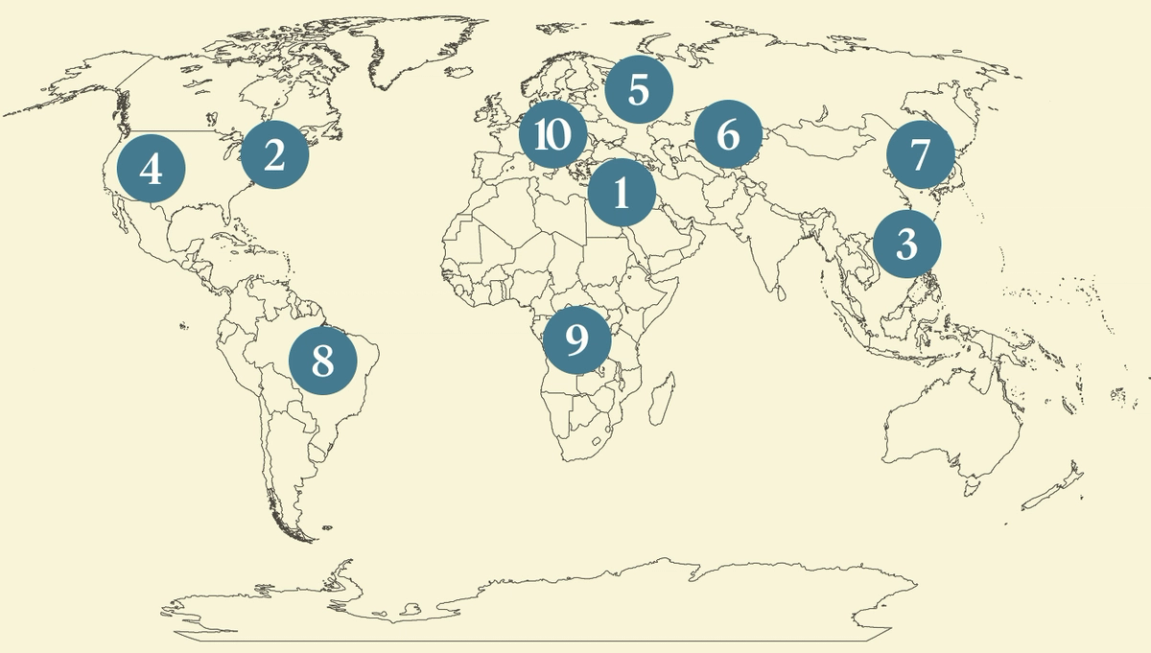 - Trump heralds Gaza deal
- Shutdown concerns deepen
- IPO revival is here
- Rare earth stocks surge
- Russian economy woes
- Chinese vocational programs
- NK’s big celebration
- Earth-cooling technique
- DRC comedy clubs
- New Literature Nobel winner
 The painter exploring Mexican national identity through landscapes, and our latest Substack Rojak. |
|
Trump, Hamas herald potential end of war |
 Shir Torem/Reuters Shir Torem/ReutersIsrael and Hamas are set to exchange hostages and prisoners within days, US President Donald Trump said Thursday, after both sides signed a deal that could lead to a lasting ceasefire in Gaza. Hamas’ top negotiator said the agreement would “end the war,” a sentiment Trump echoed, while Israel’s cabinet met to ratify the accord. The deal feels “like a new beginning” for a region deeply scarred from two years of conflict, but negotiations were rushed and the pact leaves critical questions unanswered, including how Gaza will be governed in future and what long-term monitoring mechanisms may be in place, Haaretz wrote: “Beyond the first phase, there is no political horizon.” |
|
Lawmakers dig in on US shutdown fight |
 Nathan Howard/Reuters Nathan Howard/ReutersUS lawmakers faced mounting pressure to end the government shutdown as flight delays piled up and hundreds of thousands of federal workers went without pay. The Senate Republican leader told Semafor that he was considering offering Democrats a future vote on extending health care subsidies in a bid to end the deadlock. But Democrats are “privately preparing to hold their position” for weeks, CNN wrote, in part because their concerns go beyond health care. They’re increasingly alarmed Trump “is abusing his power and cannot be trusted to abide by any conventional political deal,” The New York Times reported. Trump is testing the limits of executive power, perhaps most visibly by deploying National Guard troops to Democrat-run cities despite local pushback. |
|
Global IPO drought ending |
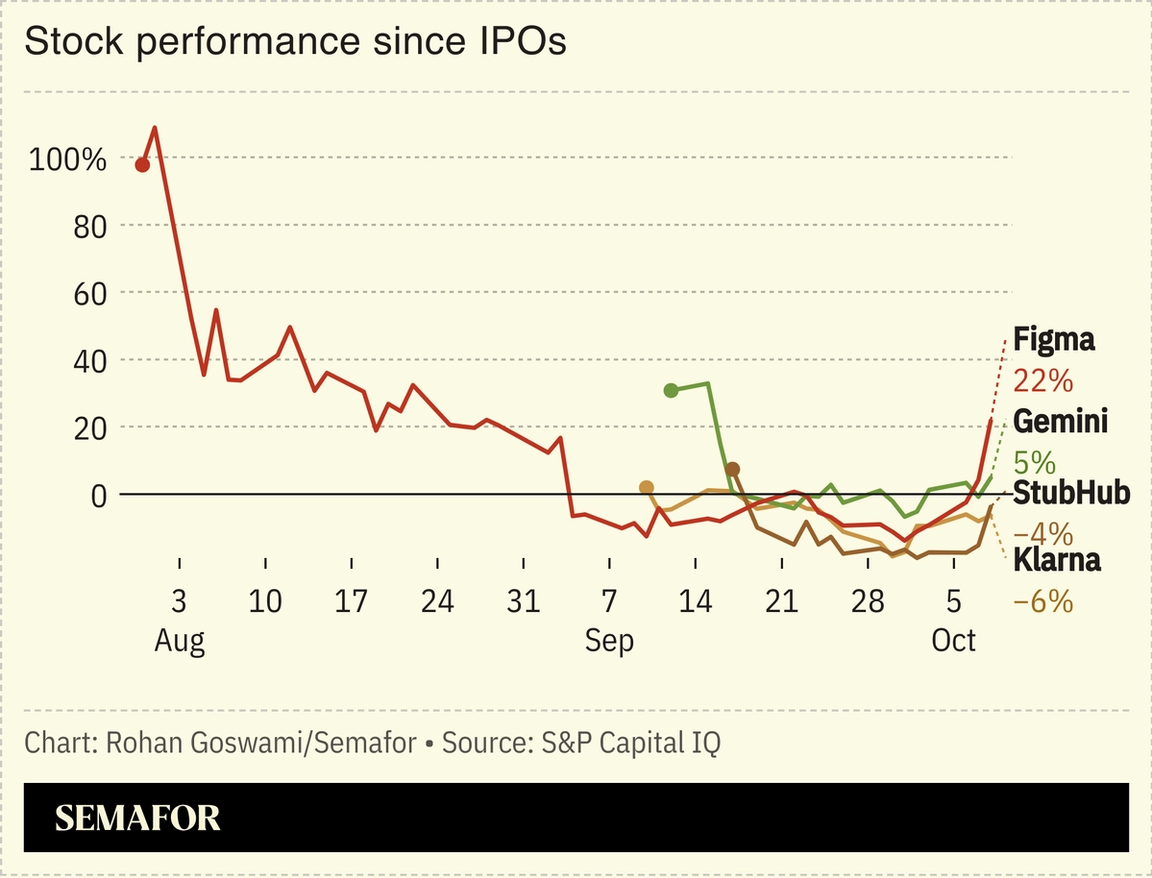 CEOs appear to be increasingly confident about taking their companies public after a yearslong drought. The amount of money raised through IPOs in the first nine months of 2025 was up 70% compared to last year. Public investors have shown an appetite for backing profitable companies, while private investors are eager for opportunities to cash out, Semafor’s Rohan Goswami wrote. While the performance of this year’s newly listed companies has been spotty, the IPO revival hasn’t been confined to the US: India, China, and Hong Kong contributed to a global resurgence in new listings, according to an EY report. |
|
US rare earth stocks surge |
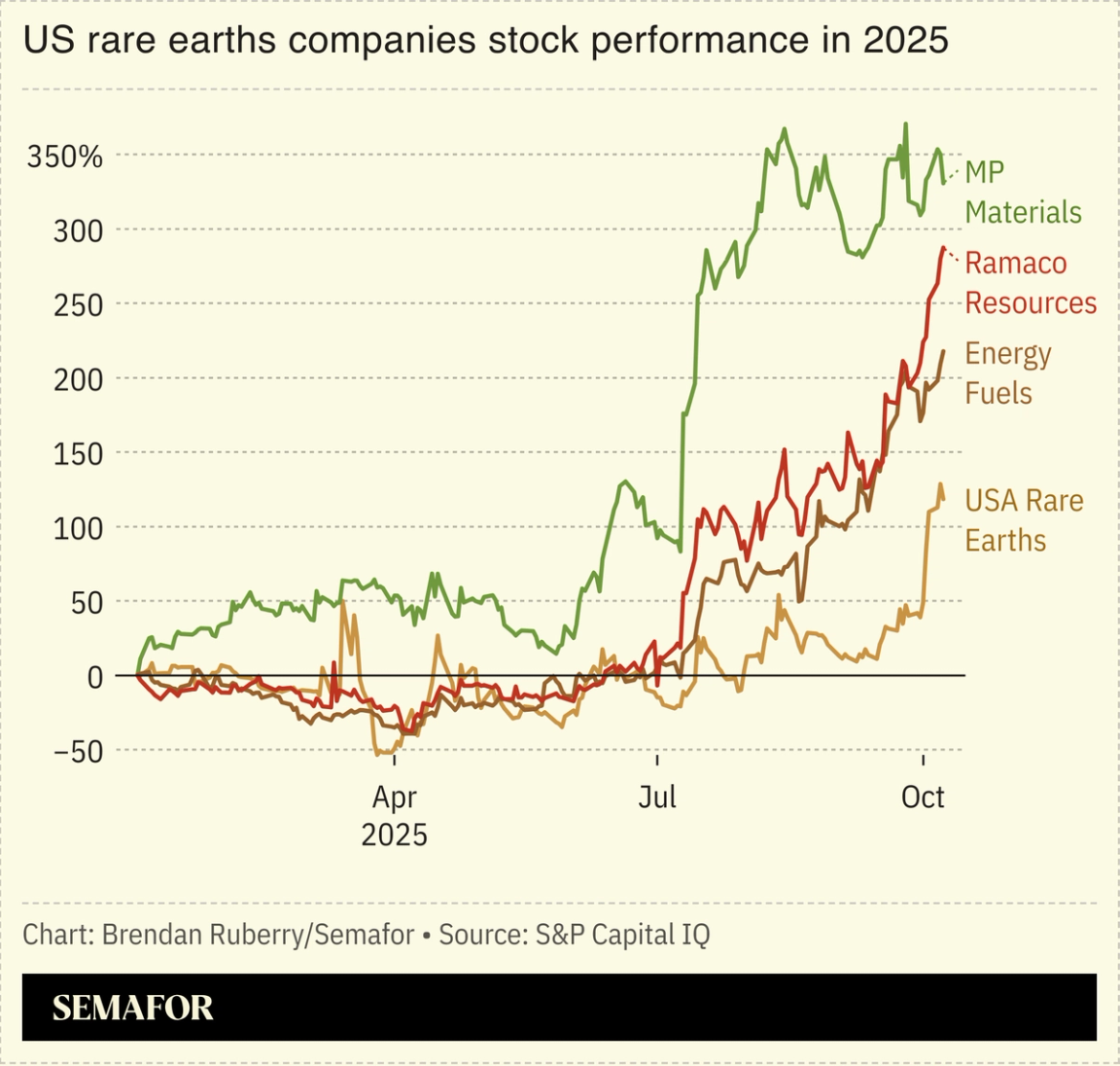 Shares of US rare earth companies jumped Thursday after China tightened export controls on crucial minerals, reopening a front in the countries’ trade war. The surge stemmed from speculation that the new restrictions would spur the US government to invest more deeply in the country’s domestic rare earth industry. Beijing’s move, Nikkei wrote, raises the stakes in a “US-China power game” that previously showed signs of cooling. It is now heating up ahead of the APEC summit in three weeks, where Trump and Chinese leader Xi Jinping are set to meet. US executives aren’t taking Beijing seriously enough over its willingness to weaponize regulations to tighten the screws on Washington, an analyst argued in CNBC. |
|
Russia shows fresh economic cracks |
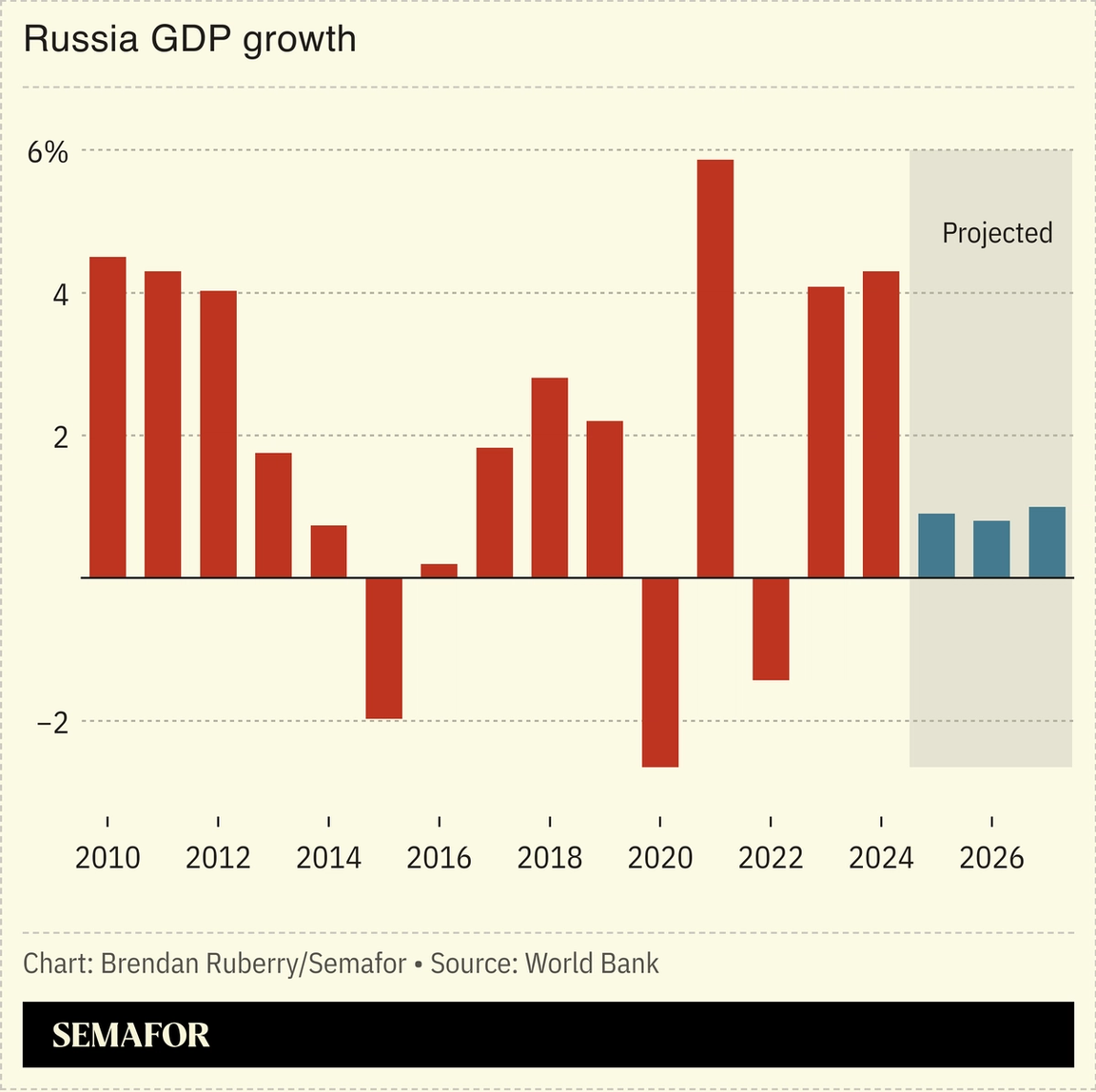 Russia’s war economy is facing a new set of headwinds as the conflict in Ukraine drags on. Several Russian industrial giants in the transportation and mining sectors are furloughing or cutting staff as domestic demand and exports slip. The World Bank downgraded the country’s growth outlook this week, saying Russia is heading toward stagnation rather than a “managed slowdown.” Investors and ordinary Russians are increasingly pessimistic. Experts have warned for years that Moscow’s economy is vulnerable and over-dependent on its war with Kyiv. But for President Vladimir Putin, “these are concerns for another day,” an economics professor wrote in Project Syndicate. The economy is yet to fully collapse, and, for now, the Kremlin cares more about making gains in Ukraine. |
|
Chinese colleges spread in Central Asia |
 Kalizhan Ospanov/Xinhua via Getty Images Kalizhan Ospanov/Xinhua via Getty ImagesBeijing is attempting to win hearts and minds in Central Asia by funding vocational colleges. China’s past engagement in Kazakhstan, Kyrgyzstan, Tajikistan, and Uzbekistan was largely focused on gathering critical minerals and energy, but that approach has fomented resentment: There have been protests over the use of land and the treatment of Turkic Muslims. To mend these rifts, China is setting up Luban Workshops, named for a legendary Chinese craftsman, to equip local youth with in-demand skills, such as EV maintenance, AI, and automation. “This push is as strategic as it is philanthropic,” Carnegie Politika wrote, as Beijing attempts to recast itself not as a threat but as a partner in the region’s economic and human development. |
|
NKorea Workers’ Party marks 80 years |
 Sputnik/Yekaterina Shtukina/Pool via Reuters Sputnik/Yekaterina Shtukina/Pool via ReutersNorth Korea’s ruling Workers’ Party of Korea marks its 80th birthday Friday, with major celebrations expected. Leader Kim Jong Un will join a host of foreign dignitaries, including Chinese Premier Li Qiang and former Russian President Dmitry Medvedev: Moscow’s invasion of Ukraine and Beijing’s tensions with Washington have boosted Pyongyang’s ties with its fellow authoritarian regimes. Kim will also likely oversee a military parade, showing off the country’s latest weaponry. Kim’s grandfather, Kim Il-Sung, was among the key figures in the WPK’s 1945 founding, and played a role in the decision to invade South Korea in 1950, leading to the northern state’s continuing isolation. |
|
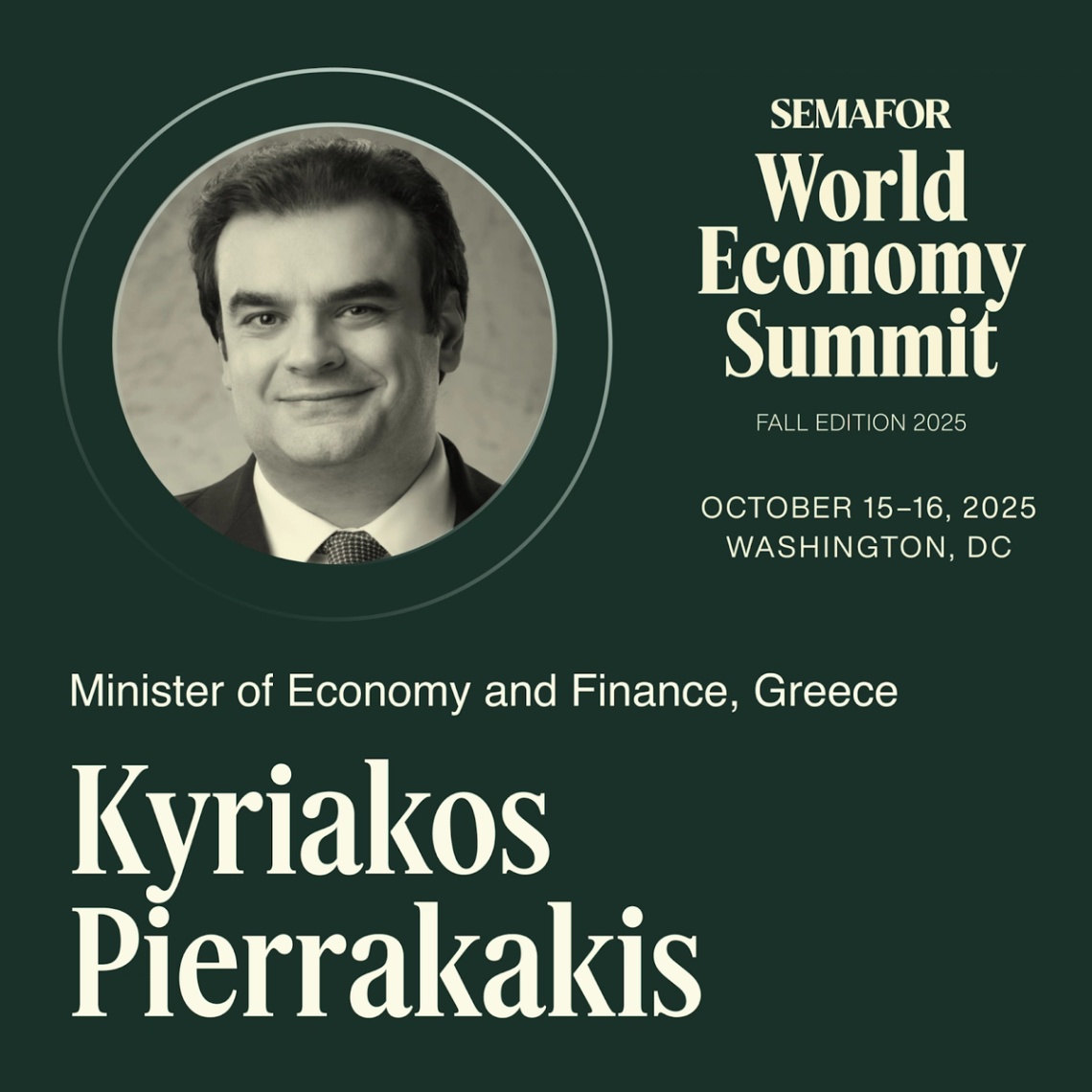 Kyriakos Pierrakakis, Minister of Economy and Finance, Greece, will join the stage at the Fall Edition of Semafor’s World Economy Summit. Hosted in the Gallup Great Hall and spanning eight sessions over two days, the summit will feature on-the-record interviews on the state of global growth and finance, AI advancements, powering global energy needs, and the forces reshaping the world economy. Each session brings together the leaders and forces most directly shaping the global economy, with programming powered by Semafor’s world-class editorial and executive leadership.
|
|
New way to capture carbon |
 Terradot TerradotScientists are attempting to speed up a natural process that captures carbon from soil and stores it in the ocean, potentially helping to cool the Earth. Private carbon removal company Terradot is using a technique known as “enhanced rock weathering.” It involves spreading tons of crushed up volcanic rock over farmland; when it rains, chemical reactions will pull carbon out of the air and into the soil, where it will convert into molecules that eventually end up in the ocean. Some scientists think it could help sequester billions of tons of carbon, enough even to slow global warming, The Washington Post reported. Others caution it may be hard to scale — it requires rain to work, for example — and its impact difficult to measure. |
|
Comedy acts as ‘therapy’ in DRC |
 Gradel Muyisa Mumbere/Reuters Gradel Muyisa Mumbere/ReutersComedy shows in the Democratic Republic of Congo are offering attendees a brief reprieve — and a laugh — amid years of grinding civil war. Thousands have died and hundreds of thousands more have been forced to flee during the conflict between government forces and M23 rebels, creating one of the world’s worst humanitarian disasters. Some of those displaced by a recent rebel advance arrived in government-held Beni, where a local organized comedy shows to “de-stress” the population. Comics told jokes about Joseph Kabila, the former president sentenced to death in absentia for war crimes. “We told ourselves, as the French say, that laughter is therapeutic, so we wanted to offer this mass therapy,” the shows’ organizer told Reuters. |
|
Krasznahorkai wins Literature Nobel |
|
|